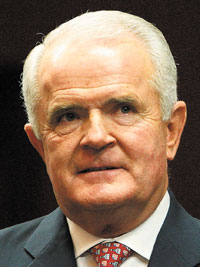Gibbons to veto bill for four-day workweek
CARSON CITY -- A bill calling for most state employees to work four-day weeks is dead this year, but the idea itself might not be.
Gov. Jim Gibbons announced Monday through aides that he will veto the bill, which would have put the plan into effect in July to help with an $887 million state revenue shortfall.
Gibbons' communications director, Daniel Burns, said the governor will veto the bill setting up the four-day, 10-hour-a-day week because it would force state agencies to work 7 a.m. to 6 p.m. Monday through Thursday.
"That won't work for some agencies," Burns said. "It would be a problem with the DMV (Department of Motor Vehicles, where some offices are open Monday through Saturday)."
Robin Reedy, Gibbons' chief of staff, said the governor will veto Senate Bill 3 on Wednesday, when Gibbons will give specific reasons for his action.
The bill, proposed by Gibbons and popular with state employees, passed both houses of the Legislature overwhelmingly, with three votes in opposition, during the recent special legislative session. Because the Legislature does not meet again until February 2011, lawmakers could not override the veto until then.
"We are investigating whether we can establish the four-day week by executive order in offices where it will work," said Reedy, who had testified for the plan.
A state law requires that most state offices remain open from 8 a.m. to 5 p.m. Monday through Friday. The bill would have ordered most state offices to be open from 7 a.m. to 6 p.m. Monday through Thursday.
An unidentified source familiar with the law said Gibbons could face a court battle if he tries to void the Monday-through-Friday law through an executive order.
Then-Gov. Bob Miller tried to use an executive order to void a 4 percent pay raise for state employees during a recession that followed the 1991 legislative session. The Nevada Supreme Court ruled that an executive order could not overturn the pay raise because it was put into law by the Legislature.
Burns said Gibbons' lawyer is looking for options the governor might have.
He admitted that the governor initially favored the four-day week but changed his mind after state agency heads indicated they might have problems if required to implement it.
The bill contains a provision under which any state agency could request the state Board of Examiners exempt it from the four-day week requirement. Gibbons leads that board.
"I'm not sure why he would veto it; it was his idea," Assembly Majority Leader John Oceguera, D-Las Vegas, said.
Oceguera said that if the governor could impose a four-day workweek by executive order, then he would have done that before now.
"I'm surprised," Assemblyman Lynn Stewart, R-Henderson, said about the planned veto. "There would be some savings with the bill."
A poll of 13,000 state employees taken by the Department of Personnel found that 82 percent favored a four-day workweek. Gibbons said many workers proposed it when he requested they e-mail him with ideas to save the state money.
Initially the administration projected a $12 million savings through the bill: $5.3 million in utility costs and $6.8 million in employee salary savings.
But legislative leaders announced last week that they had found a way to avoid salary cuts, and the only savings would be through utility costs.
Utah, which started a four-day workweek in 2008, saved $700,000 in utility costs, less than the $3 million projected savings.
Assemblyman Ed Goedhart, the only Republican who voted against Senate Bill 3, said he could not speak for Gibbons but voted against the bill because a four-day workweek would inconvenience the public without bringing significant cost savings.
"If there wasn't a significant cost savings, then I wasn't going to vote for the bill," said Goedhart, of Amargosa Valley.
The bill also devised a new policy on furloughs.
Since July, state workers have taken one eight-hour furlough day per month without pay. That reduces their paychecks by 4.6 percent.
But Gibbons proposed under his four-day, 10-hour-a-day workweek plan that employees would take an unpaid 10-hour furlough day per month. Those extra two hours would reduce their pay by 5.75 percent.
During the special session, legislators announced they had found the $6.8 million needed to keep from cutting state salaries beyond the 4.6 percent reduction already in effect. They set up in the bill a plan in which workers would take an unpaid eight-hour furlough day per month, as under the current practice, and work the other two hours.
Assemblywoman Sheila Leslie, D-Reno, said she heard that Gibbons objected to the plan because it would be awkward having employees work just two hours on one day. But she said she figured most employees would use vacation or compensatory time to avoid having to work a two-hour day.






















